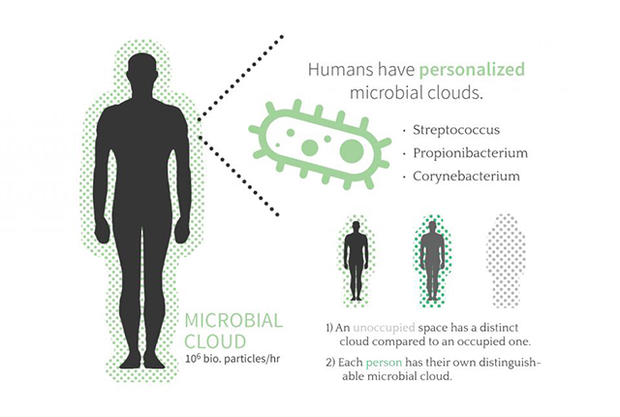
自己产生的微生物“云”会一直伴你左右
We Emit Clouds of Microbes Wherever We Go
自己产生的微生物“云”会一直伴你左右
Humans shed a million particles an hour, and those microbe-laced clouds are sometimes unique enough to identify the person producing them. Christopher Intagliata reports
人类每小时大约会掉落一百万的碎屑,这些碎屑产生的微生物“云”有时独特到可以鉴别出到底是什么人产生了它。
撰文/播音 克里斯托弗·因塔格里塔(Christopher Intagliata)
翻译 牛天宇
审校 余卉
You might blame your pets for shedding all over the house. But we humans do it too—and our stuff is alive. "We're constantly emitting microbes around us. And this is coming from shedding of our skin, from exhaling, our hair, we're just full of these guys." Adam Altrichter, a microbial ecologist at the University of Oregon. "We've never been sterile organisms. We are definitely masses of microbes both in and on us."
你可能会责备你的宠物搞得家里到处都是皮屑。别太怪它们,其实我们人类也会这样,而且,我们掉落的东西是活的。“我们无时无刻不在向周围环境散发着微生物,它们大部分来自于我们的皮肤,呼吸,头发,可以说我们浑身都是这些小家伙。”俄勒冈大学的微生物生态学家亚当?阿尔特里希特(Adam Altrichter)说。“机体从来都不是无菌的,我们的身体从内到外都充满了微生物。”
If you're picturing the Peanuts character Pig Pen, you may not be far off. Because biologists estimate we shed a million particles an hour—including, of course, a lot of bacteria. Altrichter and his colleagues wanted to measure that cloud of particles—the "Pig Pen" effect, if you will—so they asked 11 volunteers not to shower, dressed them in shorts and tank tops, and put them in a sterile chamber for hours at a time, while collecting microbial samples on surfaces and in the air.
What they found in those samples was a menagerie of bacteria from the volunteers' skin, guts, genital tracts, lungs, noses and mouths. And for eight of the 11 study subjects, the microbial cloud was unique enough to identify the individual who'd left it—suggesting that this bacterial 'fingerprint' could someday be used in forensics. The study is in the journal PeerJ. [James F. Meadow et al, Humans differ in their personal microbial cloud]
如果你还记得《花生漫画》(就是咱们熟悉的史努比系列漫画)里的邋遢鬼,我们差不多就是那样。因为生物学家估计我们每小时约会掉落一百万的碎屑,当然这里包括众多的细菌。阿尔特里希特(Altrichter)和他的同事想要准确测定这种被称为“邋遢鬼效应”的微生物“云”,他们找了11个志愿者,在不洗澡的前提下让受试者穿着背心短裤在无菌室中站几小时,然后收集空气中及地表散落微生物样品。最后研究者发现他们收集的微生物简直就像一个动物园,其中包括来自志愿者皮肤、内脏、生殖道、肺、鼻及口腔的细菌。并且在11位受试者中有8位的微生物云具有独特的个人特征。也许有一天这种细菌“指纹”可以用于犯罪现场的取证上。这项研究发表在期刊PeerJ上【James F. Meadow et al, Humans differ in their personal microbial cloud】
Given that we spend 90 percent of our lives indoors, our microbial clouds also colonize the places we live and work—and, yes, the people around us. "And so it's just kind of interesting to think about how the people that we interact with at work, or in classrooms, or in other environments, how we could be sharing some of these microbial passengers between us, not even knowing anything about it." And now that you do know about it—hopefully your view of your coworkers won’t become…clouded.
—Christopher Intagliata
我们一生大约有90%的时间在室内度过。我们产生的微生物“云”也会让细菌在我们居住工作的地方繁殖,当然,也会传播到与我们接触的其他人身上。“想想我们在工作中,在教室里,或在其他环境中默默分享身上这些微生物乘客的事就觉得很有意思。”嘛,不过现在你了解了这个过程,于是,我希望,在下次看到你同事的时候,千万不要把他们看作...一团云。
—克里斯托弗·因塔格里塔(Christopher Intagliata)
未经书面许可任何人不得复制或镜像
京ICP备11000850号-1
 京公网安备11010502039775号
京公网安备11010502039775号 信息网络传播视听节目许可证0111611号
国家科技基础条件平台

















